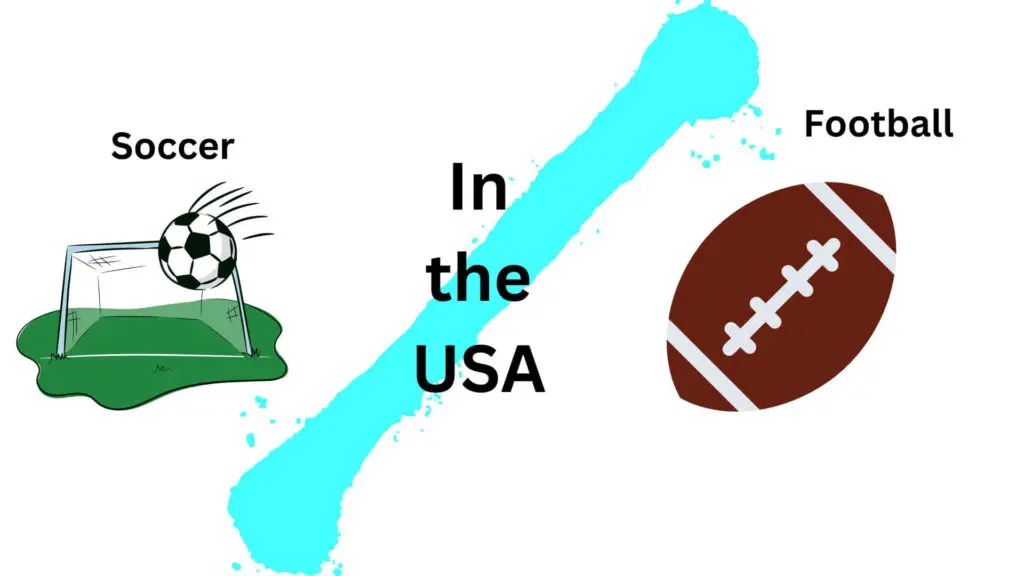Have you ever wondered why the world’s most popular sport is called “football” in some countries and “soccer” in others? The naming convention can be quite confusing, especially when it comes to American English.
In this article, we’ll delve into the intriguing history behind the term “soccer” and shed light on how it became synonymous with the beautiful game.
Prepare to embark on a journey through time and across continents to uncover the origins of this linguistic phenomenon.
Quick Navigation
- Why is Football Called Soccer?
- The Birth of Soccer
- Across the Atlantic
- Football versus Soccer
- The influence of British colonization on football terminology worldwide
- Alternative names for football/soccer in different languages and cultures
- Impact of Globalization on the Spread and Naming of the Sport
- Cultural significance of football/soccer in different regions
- The Role of Media and popular culture in shaping football terminology
- Controversies or debates surrounding the use of “football” versus “soccer”
- Evolution of football terminology in different countries over time
- Similarities and differences between football/soccer and other popular sports
- FAQ
- Summary
Why is Football Called Soccer?
Football is called soccer due to a linguistic journey. In 19th-century England, “Association Football” was abbreviated as “Assoccer” and later became soccer. In America, it distinguished itself from American football. Language evolves, and now we have football and soccer, both beloved names for the beautiful game.
I will explain it deeper throughout this article.
The Birth of Soccer

Our story begins in 19th-century England, the birthplace of modern football. During this era, the sport we now know as soccer was gaining immense popularity across the British Isles. However, it was not the only football variant being played at the time. Rugby football, with its own set of rules, was also prevalent.
To differentiate between these two versions of football, an Oxford University student named Charles Wreford Brown decided to abbreviate “Association Football” as “Assoccer” in 1863. This term gained traction within university circles and eventually trickled down to the wider population. (Wikipedia)
==>> You can also read: Who invented the bicycle kick in soccer?
Across the Atlantic
As the sport gained popularity globally, it made its way to North America.
However, American English already had its own version of football, primarily played with hands, which was known as American football. To prevent confusion between the two sports, the term “soccer” emerged as a distinctive label for Association Football.
American colleges and universities adopted the term “soccer” in the early 20th century, providing a clear distinction from American football.
Over time, the term became deeply ingrained in American culture, and thus, “soccer” became the standard term used across the nation.
Football versus Soccer

While soccer gained traction in the United States, the term “football” persisted in many other parts of the world.
The name “football” originated from the sport’s roots in medieval Europe, where villagers played a game that involved kicking a ball around a field.
The game spread across Europe, giving rise to various regional forms of football, including Association Football (soccer), Rugby Football, Gaelic Football, Australian Rules Football, and more.
Football became the dominant term across Europe, South America, and most parts of the world. It embodies the essence of the sport—using one’s feet to manipulate the ball. This linguistic diversity reflects the sport’s universal appeal and its ability to transcend cultural boundaries.
You can read more on why Americans call soccer, soccer here by The Atlantic.
The influence of British colonization on football terminology worldwide
During the height of the British Empire, the sport of football spread across continents as a result of British colonization.
As British settlers introduced the game to their colonies, they also brought with them their preferred terminology.
Consequently, many countries adopted the name “football” to refer to the sport.
This influence of British colonization on football terminology showcases how the language of the colonizers can leave a lasting impact on the cultural and linguistic landscape of the colonized nations.
Alternative names for football/soccer in different languages and cultures
While “football” and “soccer” are widely used, many languages and cultures have their own unique names for the sport.
For instance, in Spanish-speaking countries, the term “fútbol” is commonly used, highlighting the influence of Spanish-speaking nations in the football world.
In Brazil, the game is referred to as “futebol,” while in Germany, it is known as “Fußball.”
These alternative names reflect the diversity of languages and cultures worldwide, adding richness and uniqueness to the global football community.
Impact of Globalization on the Spread and Naming of the Sport
The era of globalization has significantly influenced the spread and naming of football worldwide.
As the sport gained popularity and reached new corners of the globe, local languages and cultures incorporated their own interpretations and names for the game.
This diversification has led to a tapestry of football terminologies, showcasing the global reach and adaptability of the sport.
The cross-pollination of ideas and cultures through globalization has enriched football, creating a vibrant mosaic of linguistic expressions associated with the sport.
Cultural significance of football/soccer in different regions

Football/soccer holds immense cultural significance in various regions around the world.
In countries like Brazil and Argentina, the sport is considered a national obsession, deeply rooted in the fabric of their societies. It serves as a symbol of unity, national pride, and a source of joy for millions of people.
In Europe, football is intertwined with rich footballing histories, intense rivalries, and passionate fan cultures.
Understanding the cultural significance of football/soccer helps us appreciate how it goes beyond a mere game and becomes a central element of identity and social cohesion.
The Role of Media and popular culture in shaping football terminology
Media and popular culture play a vital role in shaping football terminology and its perception in society.
Through broadcasting, journalism, and entertainment, the media has the power to popularize certain terms, nicknames, or phrases associated with the sport.
Iconic commentators, memorable catchphrases, and popular football-themed movies further contribute to the lexicon of football terminology, adding an extra layer of excitement and familiarity to the game.
Controversies or debates surrounding the use of “football” versus “soccer”
The use of “football” versus “soccer” has sparked debates and controversies over the years. In some countries, there is a strong preference for one term over the other, often leading to passionate discussions about linguistic choices and cultural identity.
These debates highlight the nuanced relationship between language, sport, and national or regional identity, showcasing how the naming of a sport can become intertwined with broader cultural narratives and sensitivities.
Debate on Social Media

In the vast realm of social media, discussions surrounding the name of the sport, whether it should be called “football” or “soccer,” often spark lively debates and passionate exchanges. Comment sections across various platforms become a battleground for individuals expressing their opinions and asserting their cultural or national identities.
Supporters of “football” argue for the use of the term due to its historical origins, its prevalence worldwide, and its alignment with linguistic conventions in most countries. They assert that “soccer” is an Americanized term that deviates from the sport’s traditional name and can lead to confusion when communicating with international audiences.
On the other side, proponents of “soccer” defend its usage, particularly in the American context, to differentiate it from American football and other regional variants. They argue that “soccer” has become firmly established in American culture and should be respected as a valid name for the sport.
These debates often involve cultural pride, personal preferences, and linguistic nuances, making them a hot topic for passionate discussion. While these exchanges can sometimes become heated, they reflect the deep connection people have with their cultural heritage and the sport they hold dear.
However, it’s important to remember that these debates are ultimately subjective and influenced by personal experiences and cultural backgrounds. At the end of the day, the love for the game transcends terminology, and the most important aspect remains the joy and unity it brings to people around the world, regardless of what name is used to describe it.
Evolution of football terminology in different countries over time
Football terminology has evolved differently in various countries over time, reflecting the distinct linguistic and cultural contexts in which the sport developed.
This evolution can be seen in the adoption of loanwords, the creation of new terms, or the modification of existing vocabulary to fit local linguistic patterns.
Exploring the evolution of football terminology in different countries provides fascinating insights into the dynamic nature of language and its adaptation to local circumstances.
Similarities and differences between football/soccer and other popular sports
While football/soccer holds a special place in the hearts of millions, it is intriguing to compare and contrast the sport with other popular sports around the world.
Examining the similarities and differences between football/soccer and sports like American football, rugby, cricket, or basketball sheds light on the unique characteristics and rules that make each sport distinct.
It also provides a broader perspective on the various ways in which people engage in physical activities and enjoy sports globally.
FAQ
1. What countries call football soccer?
The term “soccer” is primarily used in the United States, Canada, Australia, New Zealand, and Japan. However, in most other countries, including those in Europe, South America, Africa, and Asia, the sport is commonly referred to as “football.”
2. What is soccer called in Europe?
In Europe, the sport is universally known as “football.” This term is used across the continent, from the United Kingdom to Spain, Germany to Italy, and everywhere in between.
3. What does the UK call soccer?
In the United Kingdom, the birthplace of modern football, the sport is typically referred to as “football.” The term “soccer” is used less frequently, with “football” being the predominant and widely accepted name.
4. Why did Britain stop calling it soccer?
Over time, the term “soccer” faded in popularity within British English. This shift can be attributed to the country’s longstanding association with the sport of “football” and a desire to align with the global standard terminology. The use of “football” is deeply ingrained in British culture, and the term “soccer” became less favoured as other nations continued to use “football” as the standard name for the sport.
Summary
And so, the tale of football versus soccer reaches its conclusion. It began as a means to differentiate between different forms of football in 19th-century England and evolved into a distinctive term used in American English.
While the rest of the world continued to embrace the name “football,” soccer found a new home across the Atlantic.
The beauty of language lies in its evolution, adapting to regional differences and cultural contexts. Football and soccer, though separate in name, unite us all in our shared love for the beautiful game.
So, whether you call it football, soccer, or fútbol, the passion and joy it brings remain undeniably universal.
Now, as you cheer for your favourite team or lace up your boots for a casual kickabout, remember the extraordinary journey that led to this seemingly simple question: Why is football called soccer?


